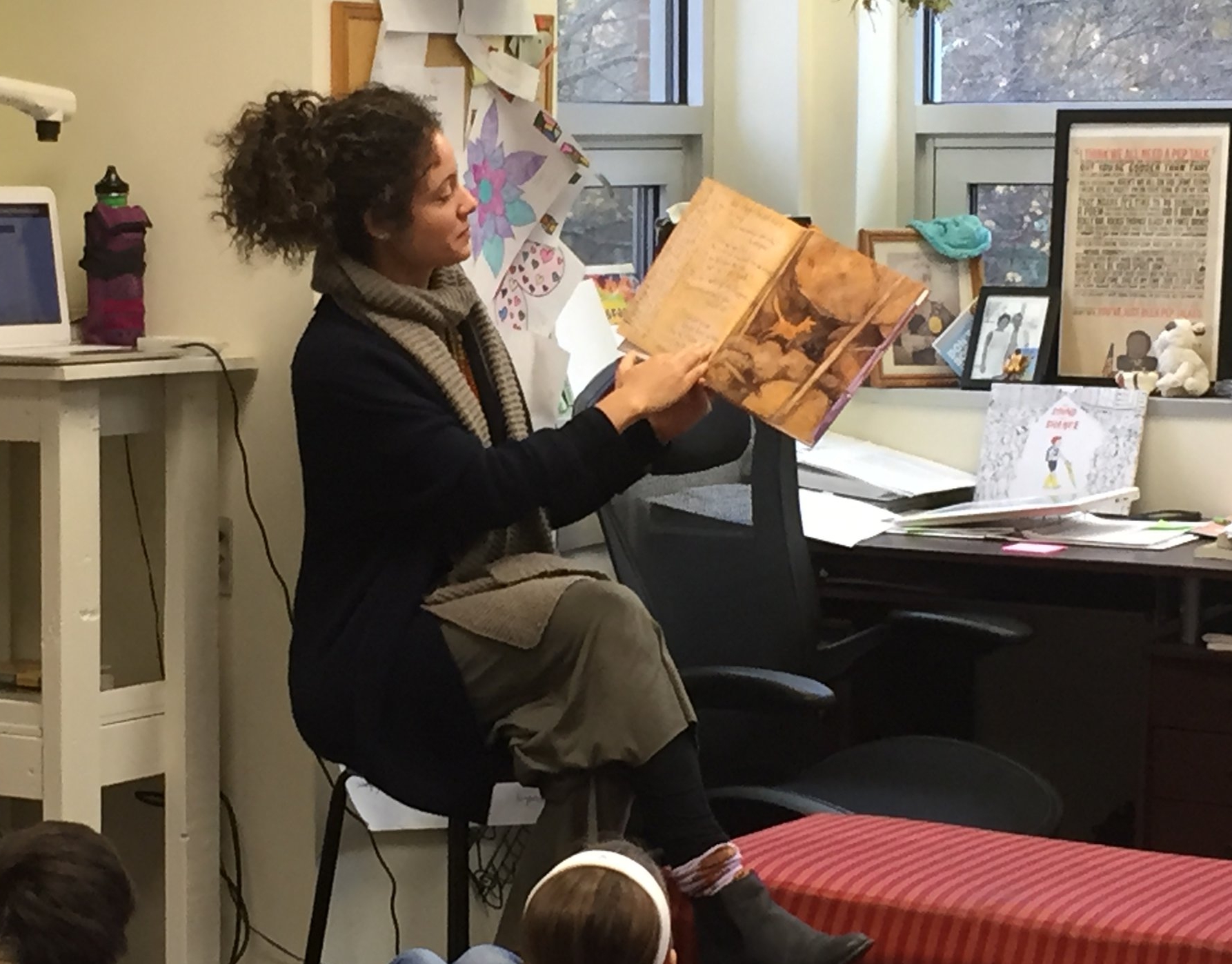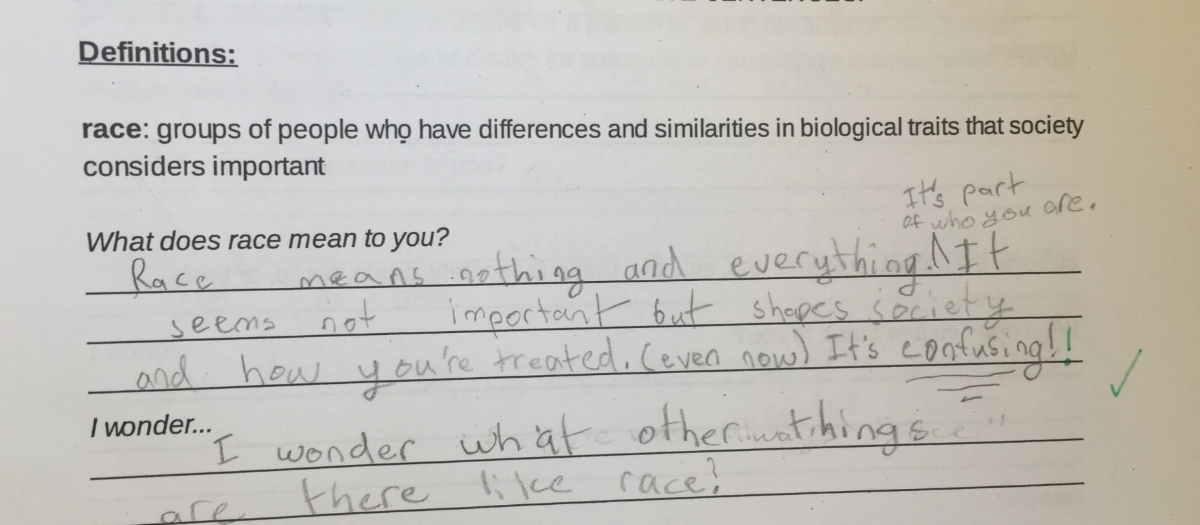Our pom pom simulation is a personal favorite. It simulates privilege, the cyclical effects of poverty, oppression, and more. Students always make new connections and take their reflections to a level we never could have anticipated. This year was no exception!
There are 3 rounds to the pom pom simulation. Round One consists of collecting pom poms. You have one minute to get as many pom poms as you can. Pom poms, of course, simulate wealth (and power). There is a catch. Students receive slips of paper with “assignments” on them. These instructions make it harder for some people to gather pom poms than others. Some examples:
You can use both of your hands, but you may not move your feet at all.
You may not bend your knees.
You must wear an oven mitt on your non-dominant hand and use that hand to pick up pom poms.
You may only use your two pointer fingers behind your back.
Only two people are allowed to use their hands and move around as they normally would. We also caution all students that if you touch or bump another body, you lose pom poms. This is a safety requirement more than anything else, but does make it harder for the students who are already limited by their instructions!
Once pom pom collection is over, we put students into three groups based on the number of pom poms they collected. This year, we had:
Students were very engaged, animatedly talking about how the collection process was “not fair” and how they deserved another chance. So we told them, ok, here you go - Round Two.
Round Two consists of making “baskets” of crumpled up balls of paper. Each group had different color paper. I told the 3rd group - little wealth and power - that they had an advantage due to their large number of members, as every time one member of the group made a “basket,” every member of the group would earn another pom pom. There were cheers when this was announced, but the celebration was short lived as we soon showed each group where they had to stand to shoot.
Group 1 was right up front, Group 2 was behind them (still too far away to easily make a basket, especially with a ball made of paper), and Group 3 was in the back of the room. Naturally, Group 1 made lots of baskets, while Group 2 and 3 only made one each. During this round, we witnessed some very creative teamwork and division of labor as well as enterprising blocking tactics and questions about whether you were allowed to take paper balls out of the baskets. After Round 2, we heard more frustration about how “unfair” the whole situation was and many requests for a new “fair” round.
So we moved on to Round 3. In Round 3, each group gets to decide what they think is a “fair” system to distribute ALL of the pom poms. We give them five minutes to discuss with their group and come up with a system they support. Each group must choose a spokesperson to present their plan to the class. They have one minute each to make a pitch for their group's plan. What students don’t know until voting happens is that voting is weighted as shown below.
Group 1 members: 5 votes each
Group 2 members: 2 votes each
Group 3 members: ½ vote each
When students saw the unequal voting power, Group 3 was livid. They had planned on winning the vote by virtue of their large number of people. Group 1 was pleased as they planned on retaining their “wealth and power” and now had the votes to do so.
Here are the plans they proposed:
Group 1: Play steal the bacon to earn pom poms. 2 people would go out from each team. Keep doing that until pompoms are gone. There are restrictions- the same as the first ones from the beginning (the slips of paper we handed out).
Group 2: Our plan is everyone gets the same amount of pompoms and if it is an odd number, we cut it up into thirds. We don't want to keep repeating what we did before. We want every group to have the same.
Group 3: Everyone would start off with 5 pompoms to meet needs and then you could work your way up by doing different challenges. No restrictions.
We voted, and Group 1’s proposal got the most votes (once we calculated in the weighting). The other students were FRUSTRATED. Group 1 was pleased - they had started out trying to think of a “fair” system, but soon realized “it doesn’t say it has to be fair.” They also were influenced by two members who repeatedly said “Stay wealthy! We should keep our power!”
At this point, we stopped the simulation and had a debrief. First we asked students to share their reactions and feelings (one sentence per person). Here are some samples:
Student from Group 3:
“When I first saw the amounts each group got, it made me feel like the people in the 3rd group were being treated like they aren't humans… ½ a vote. ½ human! Half not real. Not seen. When the people with more wealth get so many more votes, it feels like just because they have more they also should get more of everything always. We are the people working the hardest but we can’t get the things they have that we want and need.” (lots of me too’s)
Student from Group 1:
“I do agree with [student’s name] that it wasn’t fair. But our group was trying to make it so that we would still be at the top of the ladder, so it wouldn’t be as fair - you had to be strategic and life isn’t always fair.”
Once everyone shared, we reminded the students that this was a simulation that lasted less than two hours and therefore is NOT THE SAME as actually experiencing poverty, oppression, lack of privilege, discrimination, etc. This was just an activity about pom poms. We DO NOT suddenly understand how others who are actually in these situations feel, just have a tiny experience we can think about and hopefully learn from. Then we asked them to make connections to real life, both in discussion and then later as a homework reflection.
Here are some of their thoughts:
"I used to think that if you work hard you can get wealth but now I think there is more to it. I think this because If you are born without wealth you will have a disadvantage and you will be stuck behind someone who started with a lot of resources and wealth."
"I used to think that in life everything started out fairly and equally and you get to be a higher class based on what job you have and your choices. But now I know that some people are born with an advantage such as rich parents who can afford to send you to a good college which could result into a better life."


































